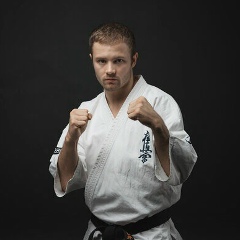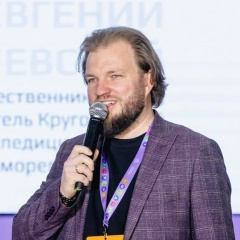В конце июня аниме Evangelion появился в Netflix. Хороший повод обсудить работу, которой в будущем году исполнится 25 лет.
Мое первое знакомство с сериалом в начале нулевых закончилось не очень хорошо. Я люблю сильных решительных героев. Постоянно хныкающий Синдзу, главный герой Evangelion, под этот типаж не подходил. Так что тогда я вырубил историю на первой же серии.
Этим летом я вновь решил вернуться к Evangelion. Поклонником аниме как направления в мультипликации меня назвать трудно, но иногда, как говориться, хочется посмотреть чего-то такого.
В такие моменты неизбежно сталкиваешься с проблемой выбора. Либо надо садиться и разбираться в новинках, читать отзывы, подбирая что-то по себя. Либо всегда можно обратиться к условному золотому пантеону.
Я обычно иду вторым путем. Так знакомишься и влюбляешься в такие работы, как Cowboy Bebop, Stand Alone Complex, Code Geass, Hunter x Hunter, Fullmetal Alchemist. И вот очередь доходит до работы Хидэаки Анно.
И тут внезапно выясняется, что внешний пафос сериала с его гигантскими роботами, мировой угрозой и роковыми тайнами — не более, чем ширма, повод для автора поговорить о более личном и гораздо важном.
В центре истории — вопрос принятия себя. То, как это возможно сделать. Пытаясь дать ответ на этот вопрос, Хидэаки Анно как будто начинает спорить с классическим тезисом Карла Маркса о том, что «бытие определяет сознание».
Тут сразу оговорюсь.
В контексте работы «К критике политической экономии» (из предисловия к которому взята эта фраза) Маркс конечно, даже не думал говорить о психологии. В 1859 году (году написания работы) оставалось еще 20 лет до открытия первой психологической лаборатории, чей запуск сегодня и принято называть годом рождения этой науки.
Маркса интересовал не отдельный человек, а в целом общественные противоречия. Но он все-таки выделял, что «сознание надо объяснить из противоречий материальной жизни». И тут же писал, что «об отдельном человеке нельзя судить на основании того, что сам он о себе думает».
И Evangelion чувствуется выросшей напрямую из этих трех утверждений работой.
Сейчас объясню.
Главное, с чем полемизирует Хидэаки Анно, так это с жесткой заданностью сознания к бытию. Он признает, что окружающая действительность создает определенные рамки, но говорит о том, что свобода воли за человеком все равно остается. Определять себя через работу (или, как бы сказал Маркс, способы производства) нельзя. Подобное лишает человека собственной личности.
При этом его характер, поступки, психика, как трактуется в сериале, — это реакция на те самые противоречия материальной жизни. Вот только побег от трудностей не разрешает ситуацию, а наоборот эскалирует, заставляет прятаться личность за те самые способы производства, олицетворить себя с функцией.
И единственный возможный выход — принятие внутренней свободы, понимание того, что кроме тебя самого тебе никто не поможет, а зацикливаться на том, что ты сам о себе думаешь — не стоит. И в твоих силах изменить, как собственный взгляд на себя, так и взгляд других.
Причем в Evangelion это проговаривается в открытую, откровенно с терапевтической целью — помочь подростковой ЦА справиться с иногда трудно и больно идущим кризисом взросления.
Только поняв это, истерики главных героев, которые могут (и, наверное, должны) раздражать, начинают восприниматься как необходимый сценарный ход, без которого все бы развалилось.
И, конечно, очарователен другой пассаж про взрослых и их интриги. Он менее явно считывается и его можно свести к емкому высказыванию Михаила Зыгаря в интервью Ирине Шихман. Автор «Империя должна умереть» и «Вся кремлевская рать» не верит в теории заговоров, теневые правительства и какие-то геополитические сценарии. По его мысли, все войны, революции и прочее случаются по одной простой причине: люди — идиоты.
В общем, Evangelion, конечно, великое. Главное, примите, что для Хидэаки Анно все эти боевые ангелы, сражения, правительственные тайны — глубоко вторичная вещь. Настолько вторичная, что он в финале откровенно про них забывает, стараясь успеть раскрыть свою философию.
Мое первое знакомство с сериалом в начале нулевых закончилось не очень хорошо. Я люблю сильных решительных героев. Постоянно хныкающий Синдзу, главный герой Evangelion, под этот типаж не подходил. Так что тогда я вырубил историю на первой же серии.
Этим летом я вновь решил вернуться к Evangelion. Поклонником аниме как направления в мультипликации меня назвать трудно, но иногда, как говориться, хочется посмотреть чего-то такого.
В такие моменты неизбежно сталкиваешься с проблемой выбора. Либо надо садиться и разбираться в новинках, читать отзывы, подбирая что-то по себя. Либо всегда можно обратиться к условному золотому пантеону.
Я обычно иду вторым путем. Так знакомишься и влюбляешься в такие работы, как Cowboy Bebop, Stand Alone Complex, Code Geass, Hunter x Hunter, Fullmetal Alchemist. И вот очередь доходит до работы Хидэаки Анно.
И тут внезапно выясняется, что внешний пафос сериала с его гигантскими роботами, мировой угрозой и роковыми тайнами — не более, чем ширма, повод для автора поговорить о более личном и гораздо важном.
В центре истории — вопрос принятия себя. То, как это возможно сделать. Пытаясь дать ответ на этот вопрос, Хидэаки Анно как будто начинает спорить с классическим тезисом Карла Маркса о том, что «бытие определяет сознание».
Тут сразу оговорюсь.
В контексте работы «К критике политической экономии» (из предисловия к которому взята эта фраза) Маркс конечно, даже не думал говорить о психологии. В 1859 году (году написания работы) оставалось еще 20 лет до открытия первой психологической лаборатории, чей запуск сегодня и принято называть годом рождения этой науки.
Маркса интересовал не отдельный человек, а в целом общественные противоречия. Но он все-таки выделял, что «сознание надо объяснить из противоречий материальной жизни». И тут же писал, что «об отдельном человеке нельзя судить на основании того, что сам он о себе думает».
И Evangelion чувствуется выросшей напрямую из этих трех утверждений работой.
Сейчас объясню.
Главное, с чем полемизирует Хидэаки Анно, так это с жесткой заданностью сознания к бытию. Он признает, что окружающая действительность создает определенные рамки, но говорит о том, что свобода воли за человеком все равно остается. Определять себя через работу (или, как бы сказал Маркс, способы производства) нельзя. Подобное лишает человека собственной личности.
При этом его характер, поступки, психика, как трактуется в сериале, — это реакция на те самые противоречия материальной жизни. Вот только побег от трудностей не разрешает ситуацию, а наоборот эскалирует, заставляет прятаться личность за те самые способы производства, олицетворить себя с функцией.
И единственный возможный выход — принятие внутренней свободы, понимание того, что кроме тебя самого тебе никто не поможет, а зацикливаться на том, что ты сам о себе думаешь — не стоит. И в твоих силах изменить, как собственный взгляд на себя, так и взгляд других.
Причем в Evangelion это проговаривается в открытую, откровенно с терапевтической целью — помочь подростковой ЦА справиться с иногда трудно и больно идущим кризисом взросления.
Только поняв это, истерики главных героев, которые могут (и, наверное, должны) раздражать, начинают восприниматься как необходимый сценарный ход, без которого все бы развалилось.
И, конечно, очарователен другой пассаж про взрослых и их интриги. Он менее явно считывается и его можно свести к емкому высказыванию Михаила Зыгаря в интервью Ирине Шихман. Автор «Империя должна умереть» и «Вся кремлевская рать» не верит в теории заговоров, теневые правительства и какие-то геополитические сценарии. По его мысли, все войны, революции и прочее случаются по одной простой причине: люди — идиоты.
В общем, Evangelion, конечно, великое. Главное, примите, что для Хидэаки Анно все эти боевые ангелы, сражения, правительственные тайны — глубоко вторичная вещь. Настолько вторичная, что он в финале откровенно про них забывает, стараясь успеть раскрыть свою философию.
In late June, the Evangelion anime appeared on Netflix. A good occasion to discuss work that will be 25 years old next year.
My first acquaintance with the series in the early 2000s did not end very well. I love strong determined heroes. Shinzu constantly whimpering, the protagonist of Evangelion, did not fit this type. So then I cut down the story in the very first series.
This summer, I again decided to return to Evangelion. It’s hard to call me a fan of anime as a direction in animation, but sometimes, as they say, I want to see something like that.
At such moments, you inevitably run into the problem of choice. Or you need to sit down and sort out the news, read reviews, picking something up for yourself. Or you can always turn to the conditional gold pantheon.
I usually go the second way. So you get acquainted and fall in love with such works as Cowboy Bebop, Stand Alone Complex, Code Geass, Hunter x Hunter, Fullmetal Alchemist. And now the turn comes to the work of Hideaki Anno.
And then it suddenly turns out that the external pathos of the series with its giant robots, a global threat and fateful secrets is nothing more than a screen, an occasion for the author to talk about a more personal and much more important one.
At the center of history is the question of self-acceptance. How this is possible to do. Trying to answer this question, Hideaki Anno seems to be starting to argue with the classic thesis of Karl Marx that "being determines consciousness."
Here I will make a reservation right away.
In the context of his work “On the Critique of Political Economy” (from the preface to which this phrase was taken) Marx, of course, did not even think of talking about psychology. In 1859 (the year the work was written), another 20 years remained until the opening of the first psychological laboratory, whose launch today is commonly called the year of birth of this science.
Marx was not interested in an individual, but in general social contradictions. But he nevertheless emphasized that "consciousness must be explained from the contradictions of material life." And then he wrote that "one cannot judge an individual person on the basis of what he thinks of himself."
And Evangelion is felt to have grown directly from these three statements.
I'll explain now.
The main thing that Hideaki Anno polemicizes with is the rigid assignment of consciousness to being. He admits that the surrounding reality creates a certain framework, but says that free will for a person still remains. It is impossible to define oneself through work (or, as Marx would say, production methods). This deprives a person of his own personality.
Moreover, his character, actions, psyche, as interpreted in the series, are a reaction to the very contradictions of material life. It’s just that running away from difficulties does not solve the situation, but on the contrary escalates, forces the person to hide behind the very methods of production, to personify himself with the function.
And the only possible way out is the adoption of inner freedom, the understanding that no one will help you except you, and you should not focus on what you think about yourself. And it is in your power to change both your own view of yourself and the view of others.
Moreover, in Evangelion this is spoken out openly, openly with a therapeutic goal - to help teenage CAs cope with the sometimes difficult and painful crisis of growing up.
Just realizing this, the tantrums of the main characters, which can (and probably should) annoy, begin to be perceived as a necessary scenario move, without which everything would fall apart.
And, of course, another passage about adults and their intrigues is charming. It is less clearly read and can be reduced to a capacious statement by Mikhail Zygar in an interview with Irina Shikhman. The author of “The Empire Must Die” and “The entire Kremlin Army” does not believe in conspiracy theories, shadow governments, or any geopolitical scenarios. According to him, all wars, revolutions and other things happen for one simple reason: people are idiots.
All in all, Evangelion is certainly great. Above all, accept that for Hideaki Anno, all these battle angels, battles, and government secrets are a deeply secondary thing. So secondary that in the finale he openly forgets about them, trying to manage to reveal his philosophy.
My first acquaintance with the series in the early 2000s did not end very well. I love strong determined heroes. Shinzu constantly whimpering, the protagonist of Evangelion, did not fit this type. So then I cut down the story in the very first series.
This summer, I again decided to return to Evangelion. It’s hard to call me a fan of anime as a direction in animation, but sometimes, as they say, I want to see something like that.
At such moments, you inevitably run into the problem of choice. Or you need to sit down and sort out the news, read reviews, picking something up for yourself. Or you can always turn to the conditional gold pantheon.
I usually go the second way. So you get acquainted and fall in love with such works as Cowboy Bebop, Stand Alone Complex, Code Geass, Hunter x Hunter, Fullmetal Alchemist. And now the turn comes to the work of Hideaki Anno.
And then it suddenly turns out that the external pathos of the series with its giant robots, a global threat and fateful secrets is nothing more than a screen, an occasion for the author to talk about a more personal and much more important one.
At the center of history is the question of self-acceptance. How this is possible to do. Trying to answer this question, Hideaki Anno seems to be starting to argue with the classic thesis of Karl Marx that "being determines consciousness."
Here I will make a reservation right away.
In the context of his work “On the Critique of Political Economy” (from the preface to which this phrase was taken) Marx, of course, did not even think of talking about psychology. In 1859 (the year the work was written), another 20 years remained until the opening of the first psychological laboratory, whose launch today is commonly called the year of birth of this science.
Marx was not interested in an individual, but in general social contradictions. But he nevertheless emphasized that "consciousness must be explained from the contradictions of material life." And then he wrote that "one cannot judge an individual person on the basis of what he thinks of himself."
And Evangelion is felt to have grown directly from these three statements.
I'll explain now.
The main thing that Hideaki Anno polemicizes with is the rigid assignment of consciousness to being. He admits that the surrounding reality creates a certain framework, but says that free will for a person still remains. It is impossible to define oneself through work (or, as Marx would say, production methods). This deprives a person of his own personality.
Moreover, his character, actions, psyche, as interpreted in the series, are a reaction to the very contradictions of material life. It’s just that running away from difficulties does not solve the situation, but on the contrary escalates, forces the person to hide behind the very methods of production, to personify himself with the function.
And the only possible way out is the adoption of inner freedom, the understanding that no one will help you except you, and you should not focus on what you think about yourself. And it is in your power to change both your own view of yourself and the view of others.
Moreover, in Evangelion this is spoken out openly, openly with a therapeutic goal - to help teenage CAs cope with the sometimes difficult and painful crisis of growing up.
Just realizing this, the tantrums of the main characters, which can (and probably should) annoy, begin to be perceived as a necessary scenario move, without which everything would fall apart.
And, of course, another passage about adults and their intrigues is charming. It is less clearly read and can be reduced to a capacious statement by Mikhail Zygar in an interview with Irina Shikhman. The author of “The Empire Must Die” and “The entire Kremlin Army” does not believe in conspiracy theories, shadow governments, or any geopolitical scenarios. According to him, all wars, revolutions and other things happen for one simple reason: people are idiots.
All in all, Evangelion is certainly great. Above all, accept that for Hideaki Anno, all these battle angels, battles, and government secrets are a deeply secondary thing. So secondary that in the finale he openly forgets about them, trying to manage to reveal his philosophy.
У записи 1 лайков,
0 репостов,
266 просмотров.
0 репостов,
266 просмотров.
Эту запись оставил(а) на своей стене Александр Семенов






















